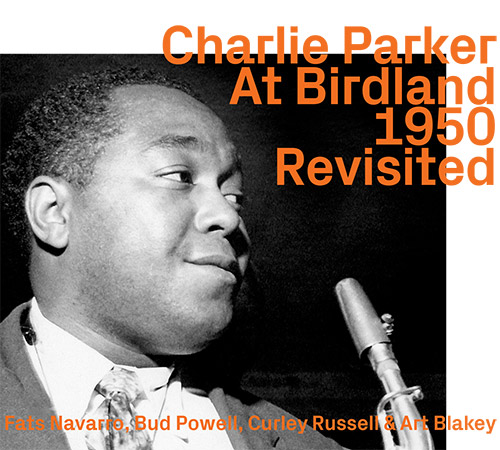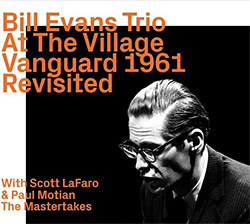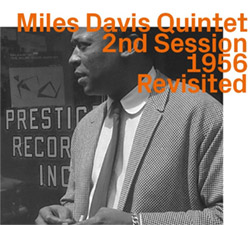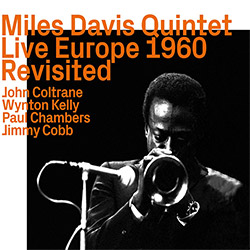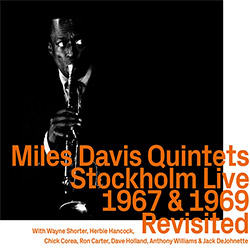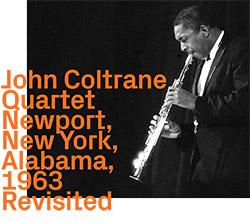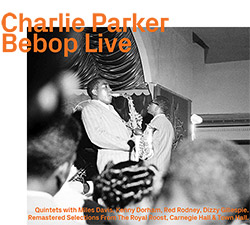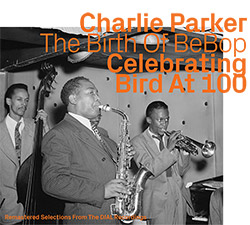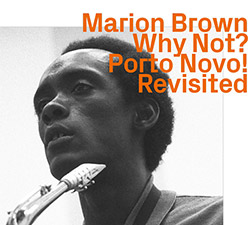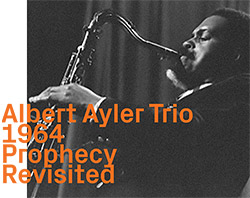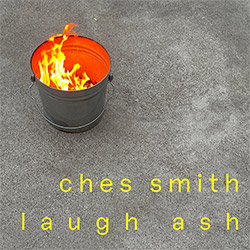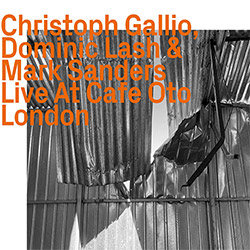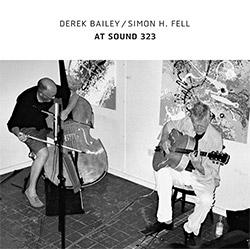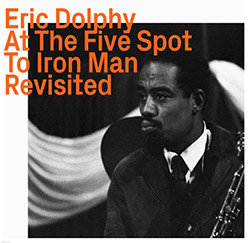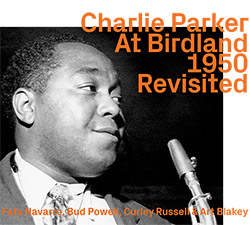
A remarkable feat of remastering, sound restoration and pitch correction from the tapes of this June 1950 radio broadcast at Birdland in NYC, finding the exceptional quintet of jazz pioneers led by alto saxophonist Charlie Parker in superb form, with Fats Navarro on trumpet, Bud Powell on piano, Curley Russell on double bass and Art Blakey on drums.
In Stock
Quantity in Basket: None
Log In to use our Wish List
Shipping Weight: 2.00 units
Sample The Album:
Charlie Parker-alto saxophone
Fats Navarro-trumpet
Bud Powell-piano
Curley Russell-double bass
Art Blakey-drums
Click an artist name above to see in-stock items for that artist.
UPC: 752156115526
Label: ezz-thetics by Hat Hut Records Ltd
Catalog ID: ezz-thetics 1155
Squidco Product Code: 33342
Format: CD
Condition: New
Released: 2023
Country: Switzerland
Packaging: Cardboard Gatefold
Recorded for radio on June 15th & 16th, 1950.
"This one was working. This one always had been working. This one was always having something that was coming out of this one that was a solid thing, a charming thing, a lovely thing, a perplexing thing, a disconcerting thing, a simple thing, a clear thing, a complicated thing, an interesting thing, a disturbing thing, a repellant thing, a very pretty thing. This one was one whom some were following. This one was the one who was working."
Gertrude Stein's 1910-11 description of the creative effort of and perceived responses to Pablo Picasso parallels the position of Charlie Parker in 1950, struggling for his music's acceptance and with his own transcendent vision and inner demons, and illuminates the complexities that ultimately energize the conflicts between entertainment and artistic expression, desperation and exhilaration. The spontaneity and tension inherent in live performance, the special circumstances of personality and place in this instance, and the brilliance of artistry on display, make this among the most valuable and visionary of bebop documents.
Consider the circumstances. The music comes from a fortunately preserved radio broadcast from Birdland - the nightclub which adopted Parker's nickname but frequently excluded him due to unreliability and bad behavior - dated 15 and 16 June 1950 (probably one long session, beginning late Monday night [the 15th] and continuing on into the early hours of Tuesday [the 16th]), in other words, an "ordinary" weeknight gig made extraordinary by the intensity and rarity of the combined personnel.
As for rarity. Though a rising star in the late '40s, trumpeter Fats Navarro was a victim of drug addiction and tuberculosis and doomed to pass away just three weeks from this date. He had worked with drummer Art Blakey in the Billy Eckstine band, and recorded with Bud Powell as far back as 1946, but crossed paths with Parker only on special occasions - a government bonds benefit in 1947, a Metronome all-star date and a Jazz at the Philharmonic gig in '49. According to the Parker discographies, this was the first documentation of Art Blakey behind Bird, with only one more similarly captured collaboration before the year was out, and possibly none thereafter. And Bud Powell's mental problems and personal friction with Parker made their appearances together few and far-between, Bird favoring pianists Al Haig and later Walter Bishop Jr. over his final years.
So this evening could have been a casual affair, a one-off unrehearsed run-through for some pocket cash, but something - psychological, emotional, or perhaps strictly musical - lit a fuse and sparked fireworks. Tempos are often extreme ("Dizzy Atmosphere" in particular approaches gravity-escape velocity), emboldened by Blakey's insistent surreal pulsation, embroidered by Navarro's circuitous midrange contours, reconfigured by Parker's jolting phrases and prickly, penetrating tone. Still, it's arguable that Powell's audacious, electrically-charged solos steal the moment - note, for just one example, his effortless adventure on "I'll Remember April."
Among the unique qualities here are the only version on tape (if the discographies are to be believed) of Parker playing the bop standard "Move" (with Bird quoting freely and reharmonizing the out chorus), and his first crack at "'Round Midnight" (just a statement of the melody - Powell takes the Monkishly percussive and tart solo). Surprisingly, Bird sits out "A Night in Tunisia," forsaking another famous alto break, turning Dizzy's tune over to Fats, with a dazzling Powell solo that set a precedent for Horace Silver to expand upon.
But it's Bird that demands our attention. In comparison to the focused intricacy of Navarro's solos (some, perhaps, constructed around his physical limitations of breath and stamina, although he sounds untroubled, his melodic breadth unaffected), Parker offers twisting patterns of thought and elaborate logic (not unlike Picasso's multiple perspectives or Ms. Stein's use of language), in the asymmetrical phrasing and leaping figures of "Wahoo" (did Eric Dolphy study this solo?), his ear-opening entrance, out of nowhere, and subsequent abstraction of "Out of Nowhere," or transformation of the familiar "I'll Remember April" into pure Bird song, culminating in a ferocious series of fours with Blakey's defiant drumming - all of which confirm that, if any further proof be needed, borrowing Ms. Stein's words on Picasso once more, "Some were certainly following and were certain that the one they were then following was one bringing out of himself then something that was coming to be a heavy thing, a solid thing, and a complete thing."-Art Lange, Chicago, April 2023

The Squid's Ear!
Artist Biographies
• Show Bio for Charlie Parker Charlie Parker: Songwriter, Saxophonist (1920-1955) Charlie Parker was a legendary Grammy Award-winning jazz saxophonist who, with Dizzy Gillespie, invented the musical style called bop or bebop. From 1935 to 1939, Charlie Parker played the Missouri nightclub scene with local jazz and blues bands. In 1945 he led his own group while performing with Dizzy Gillespie on the side and together they invented bebop. In 1949, Parker made his European debut, giving his last performance several years later. He died a week later on March 12, 1955, in New York City. Early Life Legendary jazz musician Charlie Parker was born Charles Christopher Parker Jr. on August 29, 1920, in Kansas City, Kansas. His father, Charles Parker, was an African American stage entertainer, and his mother, Addie Parker, was a maid-charwoman of Native-American heritage. An only child, Parker moved with his parents to Kansas City, Missouri when he was 7 years old. At the time, the city was a lively center for African-American music, including jazz, blues and gospel. Parker discovered his own talent for music through taking lessons at public schools. As a teen, he played the baritone horn in the school band. By the time Parker was 15, the alto saxophone was his instrument of choice. (Parker's mother had given him a saxophone a few years prior, to help cheer him up after his father had abandoned the family.) While still in school, Parker started playing with bands on the local club scene. He was so enamored of playing the sax that, in 1935, he decided to drop out of school in pursuit of a full-time musical career.Early Musical Career From 1935 to 1939, Parker played the Kansas City, Missouri nightclub scene with local jazz and blues bands, including Buster Professor Smith's band in 1937, and pianist Jay McShann's band in 1938, with which he toured Chicago and New York. In 1939, Parker decided to stick around New York City. There he remained for almost a year, working as a professional musician and jamming for pleasure on the side. After his yearlong stint in the Big Apple, Parker was featured as a regular performer at a Chicago club before deciding to move back to New York permanently. Parker was at first forced to wash dishes in order to get by.Charlie 'Bird' Parker While working in New York, Parker met guitarist Biddy Fleet. It would prove a fruitful encounter. While jamming with Fleet, Parker, who was bored by popular musical conventions, discovered a signature technique that involved playing the higher intervals of a chord for the melody and making changes to back them up accordingly. Later that year Parker heard the news of his father's death and went back to Kansas City, Missouri for the funeral. After the funeral, Parker joined Harlan Leonard's Rockets and stayed in Missouri for the next five months. Parker then decided it was time to head back to New York, where he would rejoin Jay McShann's band. It was with McShann's band, in 1940, that Parker made his first recording. Parker stayed on with the band for four years, during which time he was given several opportunities to perform solo on their recordings. It was also during his time with McShann that Parker earned his famous nickname "Bird," short for "Yardbird." As the story goes, Parker was given the nickname for one of two possible reasons: 1) He was free as a bird, or 2) he accidentally hit a chicken, otherwise known as a yard bird, while driving on tour with the band.Creating Bebop In 1942, burgeoning jazz musicians Gillespie and Thelonious Monk saw Parker perform with McShann's band in Harlem and were impressed by his unique playing style. Later that year, Parker signed up for an eight-month gig with Earl Hines. Then in 1944, Parker joined the Billy Eckstine band. The year 1945 proved to be a landmark one for Parker. At this stage in his career, he is believed to have come into his maturity as a musician. For the first time, he became the leader of his own group while also performing with Dizzy Gillespie on the side. At the end of that year, the two musicians launched a six-week nightclub tour of Hollywood. Together they managed to invent an entirely new style of jazz, commonly known as bop, or bebop. After the joint tour, Parker stayed on in Los Angeles, performing until the summer of 1946. After a period of hospitalization, he returned to New York in January of 1947 and formed a quintet there. With his group, Parker performed some of his best-known and best-loved songs, including his own compositions like "Cool Blues." From 1947 to 1951, Parker performed in ensembles and solo at a variety of venues, including clubs and radio stations. Parker also signed with a few different record labels: From 1945 to 1948, he recorded for Dial. In 1948, he recorded for Savoy Records before signing with Mercury. In 1949, Parker made his European debut at the Paris International Jazz Festival and went on to visit Scandinavia in 1950. Meanwhile, back home in New York, the Birdland Club was being named in his honor. In March of 1955, Parker made his last public performance at Birdland, a week before his death. Throughout his adult life, Parker's battles with heroin addiction, alcoholism and mental illness caused turbulence in his career and personal relationships. By the time Parker married Rebecca Ruffin in 1936, he had already started abusing drugs and alcohol. The couple had two children before divorcing in 1939. In 1942, Parker remarried to Geraldine Scott. Financial stresses created a rift between the couple, and Parker turned to heroin for an escape. He ended up leaving his second wife not long after they were married." ^ Hide Bio for Charlie Parker • Show Bio for Fats Navarro • Show Bio for Bud Powell "Earl Rudolph "Bud" Powell (September 27, 1924 Ð July 31, 1966) was an American jazz pianist and composer. Along with Charlie Parker, Thelonious Monk, and Dizzy Gillespie, Powell was a leading figure in the development of bebop. His virtuosity led many to call him the Charlie Parker of the piano.[citation needed] Powell was also a composer, and many jazz critics credit his works and his playing as having "greatly extended the range of jazz harmony." Powell's father was a stride pianist. Powell started classical piano lessons at the age of five. His teacher, hired by his father, was a West Indian man named Rawlins. At ten, Powell showed interest in the swing music that could be heard all over the neighborhood. He first appeared in public at a rent party, where he mimicked Fats Waller's playing style. The first jazz composition that he mastered was James P. Johnson's "Carolina Shout". Powell's older brother, William, played trumpet and violin, and by the age of 15 Powell was playing in William's band. Powell heard Art Tatum on the radio and tried to match his technique. Powell's younger brother, Richie Powell, was also a noted bebop pianist. In his youth Powell listened to the adventurous performances at Uptown House, a venue near his home. This was where Charlie Parker first appeared as a solo act when he briefly lived in New York. Thelonious Monk played at Uptown House. When Monk met Powell he introduced Powell to musicians who were starting to play bebop at Minton's Playhouse. Monk was a resident pianist, and he presented Powell as his protg. Their mutual affection grew, and Monk became Powell's greatest mentor. Powell eagerly experimented with Monk's idea. Monk's composition "In Walked Bud" is a tribute to their time together in Harlem. Powell was engaged in a series of dance bands, his incubation culminating in becoming the pianist for the swing orchestra of Cootie Williams. In late 1943 he was offered the chance to appear at a nightclub with the quintet of Oscar Pettiford and Dizzy Gillespie, but Powell's mother decided he would continue with the more secure job with the popular Williams. Powell was the pianist on a handful of Williams's recording dates in 1944. The last included the first recording of Monk's "'Round Midnight". His job with Williams was terminated in Philadelphia in January 1945. After the band finished for the night, Powell wandered near Broad Street Station and was apprehended, drunk, by the private railroad police. He was beaten by them and incarcerated briefly by the city police. Ten days after his release, his headaches persisted and he was hospitalized at Bellevue, an observation ward, and then in a state psychiatric hospital sixty miles away. He remained there for two and a half months. Powell resumed playing in Manhattan after released. In 1945Ð46 he recorded with Frank Socolow, Sarah Vaughan, Dexter Gordon, J. J. Johnson, Sonny Stitt, Fats Navarro, and Kenny Clarke. Powell became known for his sight-reading and his skill at fast tempos. On January 10, 1947, Powell recorded his first session as a leader, which included 8 pieces for De Luxe Records with Max Roach and Curly Russell as accompanists. The recordings were unreleased until 1949, when Roost Records bought the masters and released them on a series of 78 rpm records. Musicologist Guthrie Ramsey wrote of the session that "Powell proves himself the equal of any of the other beboppers in technique, versatility, and feeling." Charlie Parker chose Powell to be his pianist on a May 1947 quintet recording session with Miles Davis, Tommy Potter, and Max Roach; this was the only studio session in which Parker and Powell played together. [...]" ^ Hide Bio for Bud Powell • Show Bio for Curley Russell "Curley Russell was an important bassist in the early years of bebop for he was able to keep up as an accompanist with the rapid tempoes of the time. Never really a soloist (certainly not on the level of an Oscar Pettiford), Russell was a tireless performer who specialized in providing a swinging beat for the lead voices. After playing a bit of trombone, Russell switched to bass and he worked professionally from the age of 18. He was with Don Redman in 1941 and made his recording debut in 1943 with Benny Carter's Orchestra. In 1944 Russell joined Dizzy Gillespie's group and during the next decade he played with the who's who of bop including Charlie Parker (1945, 1948 and 1950), Tadd Dameron (1947-49), Bud Powell, Stan Getz, Buddy DeFranco (1952-53) and the Art Blakey Quintet with Clifford Brown (1954). In addition, Russell recorded with Dexter Gordon, Horace Silver, Coleman Hawkins, Miles Davis and Thelonious Monk among others, although never as a leader. During the mid-to-late 1950's Curly Russell gradually drifted away from jazz into rhythm and blues, finally dropping out of music altogether." ^ Hide Bio for Curley Russell • Show Bio for Art Blakey "Arthur Blakey (October 11, 1919 - October 16, 1990) was an American jazz drummer and bandleader. He was also known as Abdullah Ibn Buhaina after he converted to Islam for a short time in the late 1940s. Blakey made a name for himself in the 1940s in the big bands of Fletcher Henderson and Billy Eckstine. He then worked with bebop musicians Thelonious Monk, Charlie Parker, and Dizzy Gillespie. In the mid-1950s, Horace Silver and Blakey formed the Jazz Messengers, a group that the drummer was associated with for the next 35 years. The group was formed as a collective of contemporaries, but over the years the band became known as an incubator for young talent, including Freddie Hubbard, Wayne Shorter, Lee Morgan, Benny Golson, Kenny Dorham, Hank Mobley, Donald Byrd, Jackie McLean, Johnny Griffin, Curtis Fuller, Chuck Mangione, Chick Corea, Keith Jarrett, Cedar Walton, Woody Shaw, Terence Blanchard, and Wynton Marsalis. The Biographical Encyclopedia of Jazz calls the Jazz Messengers "the archetypal hard bop group of the late 50s". Blakey was inducted into the Down Beat Jazz Hall of Fame (in 1981). Posthumously, he was inducted into the Modern Drummer Hall of Fame in 1991 and the Grammy Hall of Fame (in 1998 and 2001). He was awarded the Grammy Lifetime Achievement Award in 2005." ^ Hide Bio for Art Blakey
4/24/2024
Have a better biography or biography source? Please Contact Us so that we can update this biography.
4/24/2024
Have a better biography or biography source? Please Contact Us so that we can update this biography.
4/24/2024
Have a better biography or biography source? Please Contact Us so that we can update this biography.
4/24/2024
Have a better biography or biography source? Please Contact Us so that we can update this biography.
Track Listing:
1. Wahoo 6:11
2. 'Round Midnight 5:17
3. This Time The Dream's On Me 6:25
4. Dizzy Atmosphere 6:49
5. A Night in Tunisia 5:41
6. Move 6:34
7. The Street Beat 9:14
8. Out of Nowhere 6:16
9. Ornithology 7:47
10. I'll Remember April 7:55
11.52nd Street Theme 1:33
12. Cool Blues 7:00
13. 52nd Street Theme 2:10
Hat Art
Improvised Music
Jazz
Melodic and Lyrical Jazz
Quintet Recordings
Jazz Reissues
Staff Picks & Recommended Items
New in Improvised Music
Hat Hut Masters Sale
Search for other titles on the label:
ezz-thetics by Hat Hut Records Ltd.

